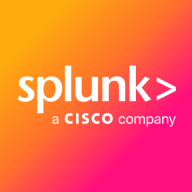

Splunk Enterprise Security and DNIF HYPERCLOUD compete in the security intelligence market. Splunk appears to have an advantage due to its advanced analytics and comprehensive data integration, offering superior real-time insights and operational intelligence.
Features: Splunk Enterprise Security provides robust data ingestion capabilities, real-time security insights, and excels in log management with schema-on-read technology. It offers powerful correlation across disparate data sources beneficial for compliance and incident response. DNIF HYPERCLOUD is noted for handling large EPS volumes with a cost-effective, open-source infrastructure. Its User Entity Behavior Analytics supports emergency response systems efficiently.
Room for Improvement: Splunk could enhance integration with various security devices and improve the user permissions system. Its cluster and search head management could benefit from GUI support instead of command-line interactions. DNIF HYPERCLOUD might improve device support and analytics capabilities to rival industry leaders. Enhancements in user interface and search functionalities would increase user friendliness.
Ease of Deployment and Customer Service: Splunk supports diverse deployment environments, including on-premises, cloud, and hybrid, with expansive technical support. However, some users report slow response times. DNIF HYPERCLOUD deploys economically on-premises and cloud environments with straightforward service, though users experience challenges due to evolving support structures.
Pricing and ROI: Splunk Enterprise Security is high-cost with significant ROI through security insights and efficiency but may not suit smaller budgets. DNIF HYPERCLOUD is a cost-effective alternative for those with tighter budgets, offering simpler cost structures with potential infrastructure savings.
| Product | Market Share (%) |
|---|---|
| Splunk Enterprise Security | 7.2% |
| DNIF HYPERCLOUD | 1.0% |
| Other | 91.8% |

| Company Size | Count |
|---|---|
| Small Business | 3 |
| Midsize Enterprise | 1 |
| Large Enterprise | 3 |
| Company Size | Count |
|---|---|
| Small Business | 112 |
| Midsize Enterprise | 50 |
| Large Enterprise | 266 |
DNIF HYPERCLOUD is a cloud native platform that brings the functionality of SIEM, UEBA and SOAR into a single continuous workflow to solve cybersecurity challenges at scale. DNIF HYPERCLOUD is the flagship SaaS platform from NETMONASTERY that delivers key detection functionality using big data analytics and machine learning. NETMONASTERY aims to deliver a platform that helps customers in ingesting machine data and automatically identify anomalies in these data streams using machine learning and outlier detection algorithms. The objective is to make it easy for untrained engineers and analysts to use the platform and extract benefit reliably and efficiently.
Splunk Enterprise Security delivers powerful log management, rapid searches, and intuitive dashboards, enhancing real-time analytics and security measures. Its advanced machine learning and wide system compatibility streamline threat detection and incident response across diverse IT environments.
Splunk Enterprise Security stands out in security operations with robust features like comprehensive threat intelligence and seamless data integration. Its real-time analytics and customizable queries enable proactive threat analysis and efficient incident response. Integration with multiple third-party feeds allows detailed threat correlation and streamlined data visualization. Users find the intuitive UI and broad compatibility support efficient threat detection while reducing false positives. Despite its strengths, areas such as visualization capabilities and integration processes with cloud environments need enhancement. Users face a high learning curve, and improvements in automation, AI, documentation, and training are desired to maximize its potential.
What Are the Key Features of Splunk Enterprise Security?In specific industries like finance and healthcare, Splunk Enterprise Security is instrumental for log aggregation, SIEM functionalities, and compliance monitoring. Companies leverage its capabilities for proactive threat analysis and response, ensuring comprehensive security monitoring and integration with various tools for heightened operational intelligence.
We monitor all Security Information and Event Management (SIEM) reviews to prevent fraudulent reviews and keep review quality high. We do not post reviews by company employees or direct competitors. We validate each review for authenticity via cross-reference with LinkedIn, and personal follow-up with the reviewer when necessary.